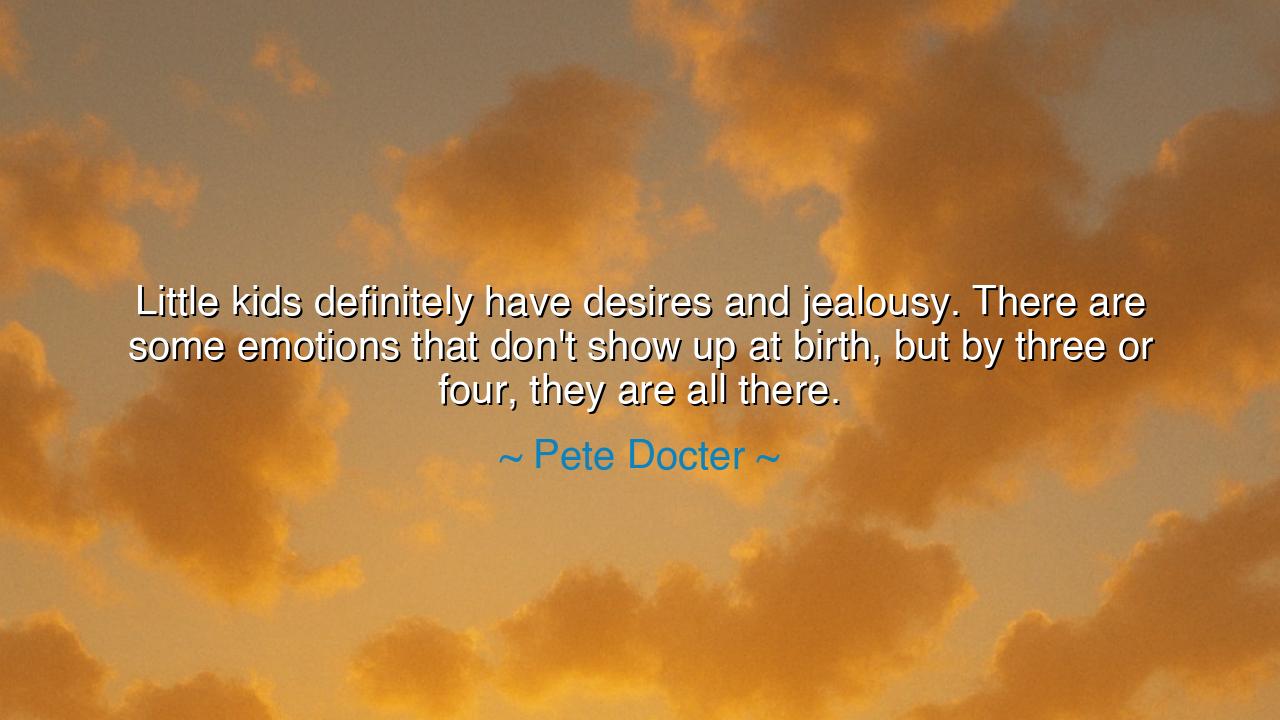
Little kids definitely have desires and jealousy. There are some
Little kids definitely have desires and jealousy. There are some emotions that don't show up at birth, but by three or four, they are all there.






In the wise and reflective words of Pete Docter, “Little kids definitely have desires and jealousy. There are some emotions that don't show up at birth, but by three or four, they are all there.” Though spoken by a creator of stories and animated worlds, these words pierce deep into the mystery of human nature. They remind us that even the smallest among us — the innocent and wide-eyed — are not blank slates, but seeds of the full human soul, bearing within them the roots of desire, jealousy, love, fear, and all the passions that shape our lives. For what is childhood, if not the beginning of the great journey of emotion — the dawn where the heart learns first to feel, to want, and to yearn?
The origin of this quote lies in Pete Docter’s lifelong exploration of emotion through storytelling, especially in his work as the visionary mind behind Pixar’s Inside Out. In that film, he gave form to feelings themselves, turning joy, sadness, anger, and jealousy into living characters within the heart of a young girl. Docter’s insight comes not from philosophy alone, but from observation — the understanding that children, though small in years, already carry within them the full range of human emotion. His words echo the ancient truth that emotion is not learned like a trade, but awakened like memory — for the heart remembers what the mind has yet to understand.
Desire and jealousy, those twin forces of the human soul, appear early in life because they are tied to the very essence of being alive — the awareness of self and other. The infant does not yet know envy, for it has not yet known comparison. But the child, as it grows, begins to see the world not as a blur of sensation, but as a garden of choices — some theirs, some not. And when another child holds the toy, receives the praise, or wins the parent’s embrace, the flame of jealousy flickers to life. This is no evil, but a natural awakening — the child discovering the landscape of emotion, learning what it means to want, and what it means to be denied. Thus, in these small rivalries, the human heart begins its education.
The ancients knew that even in youth, the passions run deep. The philosopher Aristotle wrote that children are not rational beings yet, but creatures of feeling — that their moral education begins not in instruction, but in the guiding of emotion. The story of Cain and Abel, among the oldest in human memory, tells of jealousy’s first sting: two brothers, both loved, both striving to please — yet one consumed by the desire to be more favored than the other. In that story, jealousy, ungoverned by love or understanding, leads to destruction. But within it also lies the warning and the wisdom: that emotion is powerful, and must be taught to serve, not to rule. Even the youngest soul, if left untaught, may be led astray by its own passions.
Yet Pete Docter’s reflection carries not only warning, but compassion. He reminds us that these emotions are not flaws, but the natural inheritance of every human being. A child’s jealousy is the mirror of its longing — to be seen, to be valued, to belong. And in that longing lies the seed of empathy. For when we learn to recognize our own desire, we learn also to understand the desires of others. The task of parents, teachers, and elders, then, is not to suppress emotion, but to cultivate it — to help the young learn to name what they feel, to understand it, and to transform it into wisdom.
Consider the story of Helen Keller, who, though blind and deaf from infancy, grew to understand the full depth of human emotion through the patience and love of her teacher, Anne Sullivan. When Helen first felt jealousy — when she saw her teacher give attention to another child — she reacted with fury, unable to express her grief. But in time, through education and guidance, she learned to shape her feelings into compassion. The wild anger of the child became the passionate empathy of the woman who would speak for the voiceless. Her story is proof that emotion, though untamed in childhood, can become greatness when guided by understanding.
The lesson, dear listener, is as profound as it is tender: do not fear emotion, in yourself or in the young. Desire and jealousy are not enemies to be conquered, but teachers to be understood. In a world that often silences feeling, let us instead teach our children — and ourselves — to listen to it. For it is through emotion that the human being learns to care, to strive, and to connect. The fire that burns with envy can, through wisdom, become the fire that burns with purpose.
So let us remember the truth in Pete Docter’s words: that by the age of three or four, the human heart already holds the map of all emotion. The task of life, then, is to journey through that map with courage — to know the storms of passion, but not be lost in them; to feel deeply, but love more deeply still. For it is emotion, rightly understood, that makes us not merely human, but humane — capable of both joy and compassion, both ambition and grace.






AAdministratorAdministrator
Welcome, honored guests. Please leave a comment, we will respond soon